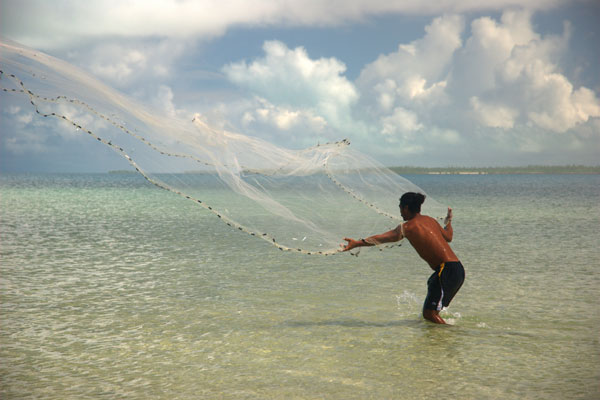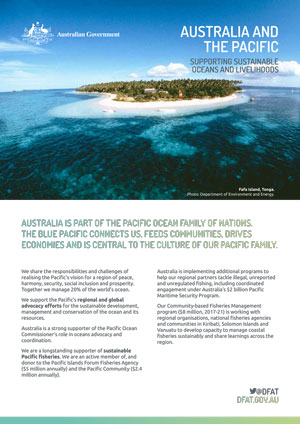Australia’s Pacific engagement
Australia Pacific Sustainable Oceans and Livelihoods Partnership
Australia is part of the Pacific family. The Blue Pacific connects us, feeds communities, drives economies and is central to Pacific cultures. More about the Australia Pacific Sustainable Oceans and Livelihoods Partnership.
We support the Pacific's regional and global advocacy efforts for the sustainable development, management and conservation of the ocean and its resources.
Australia is a strong supporter of the Pacific Ocean Commissioner's role in oceans advocacy and coordination.
Australia has recently commissioned an independent evaluation of its support for the Office of the Pacific Ocean Commissioner. The evaluation and management response can be found at Office of the Pacific Ocean Commissioner (OPOC) independent evaluation and management response.
We are a longstanding supporter of sustainable Pacific fisheries. We are an active member of, and contributor to the Pacific Islands Forum Fisheries Agency ($5 million annually) and the Pacific Community’s Fisheries, Aquaculture and Marine Ecosystems Division ($3 million annually).
Australia is implementing additional programs to help our regional partners tackle illegal, unreported and unregulated fishing, including coordinated engagement under Australia's Pacific Maritime Security Program.
Australia has provided long-standing support for coastal fisheries to provide enhanced food security, nutrition and diversified livelihoods for Pacific people. Our third phase of support ($8 million, 2021-25) aims to scale up existing community-based fisheries management programs in Kiribati, Solomon Islands and Vanuatu and extend the framework across the region.
We support the Pacific's embrace of the United Nations Decade of Ocean Science for Sustainable Development (2021-2030) to mobilise scientific research and innovation.
We recognise oceans and climate change are intrinsically linked. Australia participates in global and regional ocean observation efforts to inform decision-makers on the impact of climate change, warming and acidification on the ocean, and the role of the ocean in the global carbon cycle. We are investing $26.1 million (2018-23) for the Climate and Ocean Support Program in the Pacific.
Australia is actively engaged in a number of multilateral fora that support and advocate for sustainable oceans management. Australia participates in negotiations for the Convention on Biological Diversity’s Post-2020 Global Biodiversity Framework. We are a member of the global High Ambition Coalition for Nature and People – a platform created to advance the goal of protecting 30% of the planet’s land and ocean by 2030. Australia is also part of the Global Ocean Alliance which aims to protect at least 30% of the global ocean in Marine Protected Areas and Other Effective area-based Conservation Measures by 2030.
Australia signed the Agreement under the UN Convention on the Law of the Sea (UNCLOS) on the Conservation and Sustainable Use of Marine Biological Diversity of Areas Beyond National Jurisdiction (the “High Seas Biodiversity Treaty”) on 20 September 2023, the day it opened for signature, alongside many of our Pacific family. We had worked closely with our Pacific partners to ensure the treaty text supported our shared interests, including through: strong environmental protections for our oceans and conservation of marine biodiversity; respect for coastal States’ rights and interests; recognition of the special circumstances of small island developing States; and recognition of the rights and interests of Indigenous Peoples and of local communities. Australia continues to engage actively alongside the Pacific family as we prepare for the treaty’s entry into force and implementation. Australia is also providing capacity development assistance through OPOC to support Pacific island countries to sign and ratify the treaty.
Australia supports the protection of coral reefs through the International Coral Reef Initiative and its Global Coral Reef Monitoring Network. We also support the development and use of innovative technology to develop integrated coral monitoring in the Pacific, including through the $6.6 million ReefCloud Platform.
Protecting and restoring coastal blue carbon ecosystems (mangroves, saltmarshes and seagrasses) supports climate change mitigation and adaptation, protection of biodiversity and threatened species, disaster risk reduction and livelihoods of coastal communities. Australia is supporting blue carbon conservation in the region, including through the $6.3 million Pacific Blue Carbon Program.
Australia continues to work with Pacific island countries to establish their maritime zones and secure maritime entitlements into the future. Through our Pacific Maritime Boundaries Program, we provide financial, technical and legal support to Pacific island countries to establish their maritime zones, negotiate shared boundaries and submit extended continental shelf claims.
Since 2001, we have assisted 8 countries to establish maritime zones in their national laws and helped countries negotiate and finalise 36 out of 48 shared maritime boundaries.
In June 2019, we announced the Resilient Boundaries for the Blue Pacific project with the Pacific Community to examine the impacts of sea level rise on maritime zones, and develop innovative, Pacific-led solutions ($3.5 million, 2019-2024).
More about the Australia Pacific Sustainable Oceans and Livelihoods Partnership
The Australian Government is committed to working with our Pacific family to combat marine litter
Waste management continues to be a significant challenge in the Pacific region. Pacific island countries have limited land available for waste management and are far from recycling markets.
Recognising marine litter as a serious problem for the environment, public health, and economic development, Australia has demonstrated its commitment to addressing plastic pollution in the Pacific region. We are investing in regional initiatives to address the Pacific waste management challenges, in collaboration with international partners and experts.
Australia is a supporting member of the ANZPAC Plastics Pact, an industry-led regional pact focused on accelerating a circular economy for plastic packaging and reducing plastic waste and pollution in the Pacific island region.
Australia, Pacific Island countries and other Member States of the United Nations Environment Assembly agreed to launch negotiations on a new global treaty to combat plastic pollution. Australia has provided funding assistance of $729,000 from 2022-24 to the Secretariat of the Pacific Regional Environmental Programme (SPREP) to build capacity and support Pacific Island country preparations for, and participation in, negotiations for the treaty. Australia joined other countries at the resumed fifth session of the UN Environment Assembly to launch these negotiations.
This complements our regional support for tackling plastic pollution, including through the $16 million Pacific Ocean Litter Project aimed at phasing out single use plastics, and changing behaviours of users, consumers and producers of plastic.
Broader international cooperation is also needed to address marine litter. Prime Minister Albanese is a member of the 17-nation High Level Panel for a Sustainable Ocean Economy, which is working to build momentum towards a sustainable ocean economy in which effective protection, sustainable production and equitable prosperity go hand-in-hand. The Australian Government has also committed to signing up to the Ellen MacArthur Foundation New Plastics Economy Global Commitment in 2022. Australia is also a signatory to the Commonwealth Clean Ocean Alliance, the United Nations Environment Programme's Clean Seas Campaign, and the G20 Marine Litter Action Plan and its Implementation Framework for Actions on Marine Plastic Litter.




